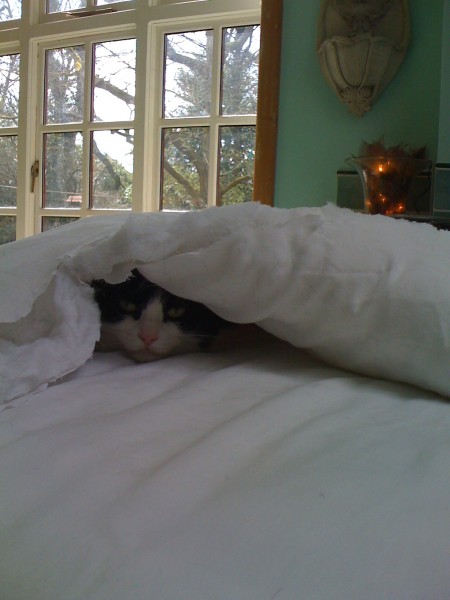Here’s a photo of my poor cat Mitsi after watching the Mary Bale video:

She hid under that blanket for hours, quaking with fear, even after I explained to her that Mary didn’t know where we lived. Moose even tried to talk her out but it was no good – she wasn’t to be moved:

As for Siamese Suki and fluffy pal, Chloe, they just looked understandably annoyed by the footage:

Ace and Cindy, the other two members of the Bell cat gang, were unavailable for comment.
This Mary Bale thing puzzles me for two different reasons. For starters – like most other sane people in the world – I don’t understand why Mary Bale took it upon herself, entirely unprovoked, to throw a friendly moggy into a bin. The simple explanation is that she’s a mean old bat, and a little bit bonkers (and bears more than a passing resemblance to the Bigoted Woman of election notoriety . . .) But that’s not the only thing that puzzles me about this whole affair. Indeed, what puzzles me the most is the general public’s reaction to it.
As an animal rights activist and ardent cat lover, I understand why I dislike Mary Bale but, as for the rest of society, I’m not entirely sure. I would like to think it’s because, when an act of cruelty towards animals is brought to peoples’ attention in this way, they, quite rightly, condemn it. And yet it seems incongruous for anyone who eats meat, or who buys Fairy Liquid or Head and Shoulders or Pringles or any other product manufactured by an animal testing company such as Proctor and Gamble, to claim to be outraged by Mary Bale’s act – and I strongly suspect that the vast majority of people who joined the Facebook hate groups fall into both those categories.
I read an article (http://www.guardian.co.uk/commentisfree/2010/aug/28/cat-litter-pets-protected-and-persecuted) yesterday by Guardian journalist, Michele Hanson, commenting on the Mary Bale/wheelie bin incident, in which she states, quite correctly, that we are a confused nation when it comes to animal rights. We claim to be a nation of animal lovers but, sadly, many people seem wholly incapable of putting their money where their mouths are. Naomi Campbell, for example, was quite happy to pose naked for a Peta anti-fur advert – presumably because she got to take her clothes off and look all sexy and sultry and stuff – but then, fifteen years later she’s photographed pouting alluringly in a fur coat (http://www.dailymail.co.uk/tvshowbiz/article-1210423/Naomi-Campbell-models-sable-coat-15-years-Peta-anti-fur-advert.html). Many, many people only identify themselves as animal rights activists, or animal lovers, when it is fashionable – or easy – to do so. When it simply involves condemning another person, for example, and not inconveniencing their own lives in any way by giving up something they love or changing the way they behave.
There seems to be a disturbing tendency amongst the British public (and probably any other country’s public) to cherry-pick which causes to be excessively outraged about, and which to merely shrug shoulders over and say: ‘It’s only an animal.’ I do not expect other people to feel the way I do about animal rights issues but, for God’s sake, can’t there at least be a little bit more consistency and a little less hypocrisy?
For example, I read an article a while back about a man who killed his neighbour’s little border terrier, Wurzel, after it got into his garden (http://www.dailymail.co.uk/news/article-1209475/Company-boss-battered-neighbours-barking-pet-dog-death-hoe.html). The dog was hit over the head with a shovel. The RSPCA chose not to prosecute because, they said, Wurzel did not experience “undue pain” (a requisite for prosecution under the Animal Welfare Act 2006). Let’s be clear about this – Wurzel did not die instantly. He was tossed over the wall back into his own garden, where his owner later found him lying on the porch shaking and covered in blood. He had to be put down later that same day. If that’s not “undue pain” then what is? Since the RSPCA declined to press charges, the dog’s owner was forced to spend her own money bringing a private action for the only charge available to her – that of criminal damage to private property (since, legally, that’s all a pet is – property). She lost. Animals are woefully under-protected by the law, and charities like the RSPCA can only do so much when they are continually fighting an uphill battle with limited funds.
I’ve seen several commentators over the last few days suggesting that people get more worked up about cruelty to animals than cruelty to people. This is utter nonsense. As Wurzel’s case so aptly proves - people don’t get more outraged about cruelty to animals than cruelty to people - they get more outraged over cruelty they can actually see. Wurzel’s case infuriated me when I read about it and, although it was covered in the news, it certainly was not highlighted the way that Lola’s case has been. The explanation, I suspect, is that Mary Bale was caught on tape, whereas Neville Hill’s monstrous act of hitting a little dog on the head with a shovel was not. If his cowardly attack upon the dog had been filmed then I have to assume people would be even more incensed over this than they were over Lola. Surely that’s the only sensible explanation, isn’t it? I mean, surely everyone agrees that killing a dog with a spade is worse than putting a cat in a bin? So it would seem that, sadly, people are only able to feel outrage over the injustices they can actually see. I don’t understand this. Obviously, as a writer of fantasy fiction, imagination is supposed to be my forte and all that, but I wouldn’t have thought it beyond the realms of possibility for ordinary people to imagine a scenario such as the one reported with Wurzel.
So to all those people getting their knickers in a twist over Mary Bale, rushing to join online hate groups and so on, I would remind them that there are many, many injustices to animals that we do not see but that exist nonetheless. If you eat meat, if you buy Fairy Liquid (or any other product that has been used to torture rabbits), or barn eggs from caged hens, then you actively perpetuate those injustices. There is no softer way of putting it. Perhaps such people might reflect for a moment on the wise words of Albert Schweitzer: ‘Think occasionally of the suffering of which you spare yourself the sight.’ And let’s cease indulging in this fiction that Mary Bale is significantly worse than the average British citizen out there. She isn’t really. The difference is that she got caught.
Having said that, I would be much more shocked to see a CCTV video of an acquaintance of mine throwing a cat in a bin than I would to see a video of them eating a burger. Since I believe that eating meat is ethically worse than what Mary Bale did (because slaughtering an animal – whether you do it yourself, or pay someone else to do it for you – is worse than putting an animal in a bin), I’m not really sure why this should be. It’s a strange cultural by-product, I suppose, of the society we live in. Eating meat is considered socially acceptable – binning random moggies is not. And it seems that I can’t help but be affected by this social norm, even when I don’t want to be. I suppose, in addition, even though Lola was not seriously hurt, Mary Bale’s act was deliberately and maliciously cruel, whereas most meat eaters and Fairy Liquid users – I hope – are not. People know animals have to be slaughtered in order to end up a slab of meat on their plate, but they try not to think about it. Or perhaps they are incapable of properly imagining it.
Sir Paul McCartney said that ‘if slaughterhouses had glass walls, everyone would be a vegetarian.” I hope this is true. I dearly hope that it is. Because it if isn’t, it means that people don’t ignore the many injustices to animals that are so prevalent in our world because of the fact that they fool themselves into thinking they don’t exist, it means they ignore the injustices because they simply don’t care. And I would like to hope that deep, deep down, people are better than that.
In conclusion, then, logically I don’t think Mary Bale is any worse than the average meat-eating Briton but, emotionally, I can’t help but condemn her more than I condemn them. Nevertheless, there is a moral inconsistency here, and one that should be recognised in amidst all the hysterical outrage and excessive condemnation.
On that note, here’s one last snap of Suki, my tiny Siamese:

She knows I live to serve her. And if anyone ever attempted to grab Suki by the scruff of her neck and throw her into a bin, I’m afraid that I would lose my rag rather spectacularly. She may be wonky, she may be bent, she may be ever so very neurotic, but that cat is the absolute apple of my eye and I won’t pretend to be anything less than completely and utterly besotted with her, and her big blue eyes, and her teeny, tiny feet.








